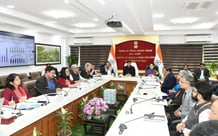The contextual comparison of the throes of childbirth with the uncertainty in recent times can no better be evoked by the imagery of a rock and a hard place. Giving birth is an uneasy task on its own; having it to do it in this period presents a greater challenge. Even for developed countries, the strain on the healthcare system imposes certain modifications and restrictions on child delivery, how worse is it for underdeveloped and developing countries in other parts of the world? Over 300,000 babies are born every day with the highest birth rate occurring in Africa but sadly, the high fertility rate in the continent contrasts with the fragility of the healthcare system. As of May 6, the total number of confirmed novel coronavirus cases has exceeded 3 million worldwide, and at this pace, it is better to stay home than at the hospital if not ill. Pregnant women do not stand the risk of exposure at delivery only, but each clinic visit for antenatal and postnatal care may pose a problem. Protecting the health of the mother and child is a top priority and in times like this, even the healthcare professional needs protection.
The Antepartum period
From conception, the development of the child in the womb for nine months is a sensitive period. The antepartum period for a mother presents a need for certain food nutritional requirements and antenatal care. Ensuring that the mother is free from conditions that may hamper or interfere with child development is necessary. In line with precautionary measures, social distancing is important to prevent COVID-19 transmission, but this becomes tough for pregnant women to access the clinics for antenatal care due to lockdown and inhibition of movement across various states. In Sub-Saharan Africa, inaccessibility to clinics is not the only problem; hunger is an even greater problem. Commercial activities have been on a stand-still and earning an income in this period is very difficult. Imagine the number of hawkers who sell their goods in traffic jams and busy cities, how does the government expect them to survive now? Not only is the informally and self-employed adversely affected but also people formally employed in organizations have not been receiving salaries. Feeding a single mouth is not easy, how much more feeding a mother and an unborn child?
The Intrapartum period
Child deliveries can occur in various ways depending on the health of the mother and child and the desire of the mother to deliver the child on her own, but regardless, the presence of a skilled health professional to assist the delivery is necessary. More than one professional is needed for a Cesarean delivery. Whether in a maternity home, clinic or home of the mother, the delivery of a child re-inforces the need for following necessary precautions. Health resources are stretched thin at the moment and prioritizing these resources is important. Foremost, the room for delivery has to be decontaminated and the mother-to-be tested for the novel coronavirus especially if she presents suspicious signs and symptoms. Ensuring that the hospital ward for child delivery is as far as possible from patients treated for Covid-19 and that the conditions for the child delivery do not endanger the health of the child is the priority.
Subscribe to our newsletter!
-partum period
After the sweet sorrow of child delivery, comes the joy of dancing a newborn baby in one’s arms. The joy of motherhood glimmers hopes in these downtimes. Taking care of the newborn is a delicate duty of both parents since the child is very much fragile and still developing. Decontamination of all surfaces in the home is essential, and as much as we love to pass the baby into the arms of well-wishers and friends, it is best not to. Only the parents and immediate family of the child should be allowed access to carry or take care of the child. Even for parents, washing of hands and proper hygiene is necessary before they can touch the baby. Sadly, children born in this pandemic period will not enjoy the festivities and extravagant feasts that surround the birth and naming of a child in Africa and rather than opening their eyes to the smiling faces of family and friends, their first sights will be the faces of people covered in nose masks.
It is a really hard time for all of us this period, and if there was a time lens that had peered into this future, a lot of people would have stayed away from getting pregnant; nevertheless, the cry of a newborn might be just what we need to get over our despair. Following necessary precautions is of utmost importance in this pandemic and ensuring that the health of the child is preserved is paramount. Giving birth in a pandemic is challenging but the joy of parenthood justifies the troubles.













